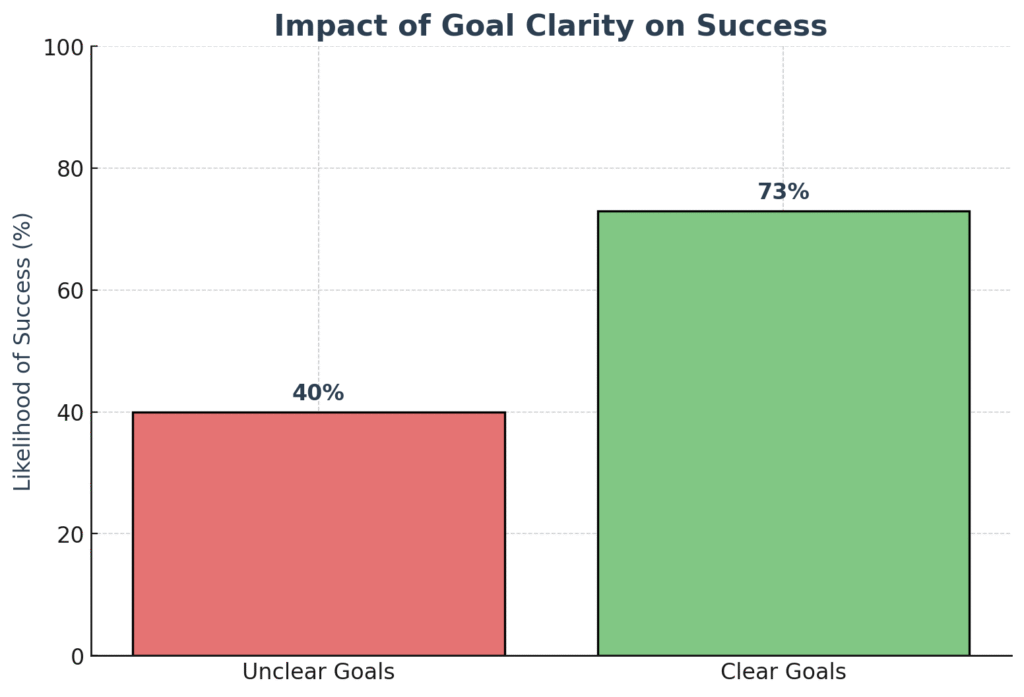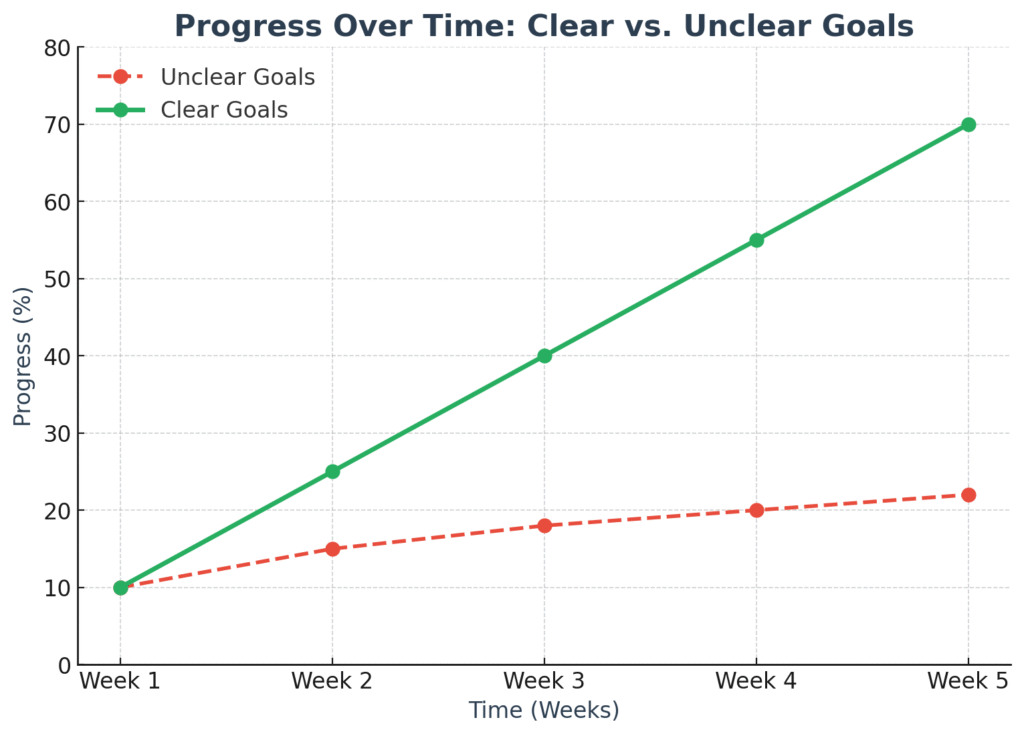Introduction
When you feel that your life is stuck and shadow of darkness surround you then instead of worrying, create your personal development goals. Because creating personal development goals will not only give you aspirations but also design a roadmap that turns your dreams into reality. Research from Locke and Latham’s Goal-Setting Theory (1990) shows that specific goals significantly improve motivation and performance compared to unclear intentions. Another study in the Journal of Applied Psychology found that persons who set personal goals are 33% more likely to achieve positive life changes than those who don’t.
Let’s take example of student who simply wishes that “I want to secure good position in exams,” but have no clear vision how to do this is more likely to fail as compare to another student who sets personal goals like, “I will study two hours daily using active recall techniques,”. It’s quite clear from above example that clear vision with define goals ensure success. By mastering the art of setting personal development goals, you gain not only direction but also the discipline to create a purposeful life.

” Clarity is power! Research shows that people with clear goals are nearly twice as likely to succeed as those with vague intentions. Define your vision—then chase it with purpose.“
let’s now explore the proven steps that can help you design goals which not only inspire you but also guide you toward lasting success.
1. Self-Reflection
Self-reflection not only helps you to figure out your strengths and weaknesses but also provides awareness of where you currently stand in different areas of your life, such as career, health and relationships. This awareness helps you set measurable and achievable goals. For example, if you realise through self-reflection that you have set unrealistic goals, as a result, your health is getting compromised.
With this clarity, you can set a focused goal like doing a 30-minute daily walk instead of wishing to get fit. In addition, self-reflection helps you eliminate unimportant tasks and focus on the goals that really matter. Moreover, it allows you to track your progress and make adjustments accordingly. It also keeps you accountable and committed to your goals.

2. Define Clear and Specific Goals
Clear and specific goals are like a roadmap which guides you towards your destination. By setting clear goals, you realise what you actually want. This realisation helps you to align your action towards a specific task, which results in significant progress in minimum time. Specific and clear goals don’t let you get distracted. You become familiar when you are off track, so you can correct yourself more effectively.
For example. If you want to appear for a competitive exam, instead of thinking that “I can’t do this” or “I’m not capable”, set a specific goal: “I’ll study 6 hours a day and give 1 hour for revision and complete one practice test every Sunday.” This practice will not only give clarity but also make your goals measurable and achievable.
Research from Locke and Latham’s Goal Setting Theory (2002) found that specific goals consistently lead to higher performance than unclear ones. Their studies show that when people know exactly what they are working toward, they keep motivated and committed. This motivation and commitment makes them distinguished and successful.

” Success isn’t about working harder—it’s about working with direction. Clear goals accelerate progress step by step, while unclear goals keep you stuck in place.“
3. Break Goals into Actionable Steps
Divide large goals into small, manageable tasks and create a step-by-step action plan with deadlines for each step. For example, if your goal is to learn a new language, your steps might be:
a) Enroll in a language class
b) Practice for 30 minutes daily.
c) Join a conversation group.
Big goals often seem intimidating and out of reach. When you break them into smaller, manageable steps, the path becomes clearer and less overwhelming. Instead of being overwhelmed by the big picture, you can concentrate on one step at a time. This focused approach helps prevent procrastination and maintains momentum. Actionable steps can be scheduled more effectively, fitting into your daily routine. This structured approach maximizes productivity and reduces wasted time.
4. Set Milestones and Track Progress
Setting milestones and tracking your progress are key components of goal setting that propel you toward mastery in life. Milestones act as checkpoints on your journey, marking important steps toward success. They help you see a clear path from where you are now to where you want to be. Knowing that you are just one step away from the next milestone keeps you motivated. Each completed milestone provides a sense of accomplishment, boosting your confidence.
When you encounter setbacks, milestones help you regroup and adapt without losing sight of the main goal. It’s easier to restart from the last checkpoint than to begin all over again. Each milestone is an opportunity to celebrate your progress. These celebrations energize you to push forward with greater enthusiasm. Tracking your progress lets you see what is working and what is not. If you are behind, you can adjust your strategy before it’s too late. If your goal is to “Launch an Online Business” your milestones might be:
a) Research the market and create a business plan.
b) Build the website and set up social media platforms.
c) Launch your first product or service.
d) Reach your first 100 customers.
e) Achieve monthly revenue targets.
5. Anticipate Challenges and Plan Solutions
When you anticipate challenges and plan solutions, you build resilience and reduce the impact of setbacks. This proactive mindset is critical to mastering your life. Planning solutions to anticipated challenges strengthens your ability to bounce back. You become more adaptable as you learn to navigate obstacles with confidence. Many goals fail not because of poor planning but because you are not prepared for setbacks.
If you anticipate challenges and have solutions ready, your chances of success increase dramatically. Unexpected challenges can completely derail progress if you’re not prepared. With a pre-planned strategy, you can pivot more easily and stay on track. When you have a plan for potential problems, you approach your goals with more confidence. It’s easier to take bold steps when you know you’re prepared for setbacks. If your goal is to “Save $10,000 in One Year” potential challenges might include:
a) Unexpected Expenses → Solution: Build a $500 emergency fund as a buffer.
b) Job Instability → Solution: Create a side income stream or increase savings during high-earning months.
c) Overspending Habits → Solution: Set a monthly budget and track expenses weekly.
6. Stay Accountable
Being accountable means holding yourself accountable for your goals and actions. This simple concept is incredibly powerful for mastering your life. Accountability keeps your goals in mind, preventing them from slipping into the background. When you know you have to report your progress to yourself or someone else, you’re more likely to follow through. When you are accountable, there is less room for excuses. Deadlines and even personal commitments force you to take action, even when you don’t feel like it.
Regular check-ins allow you to measure progress and adjust as needed. If you are falling behind, accountability forces you to confront the issue and make the necessary changes. Holding yourself accountable helps you develop integrity. You do what you say you will do. It strengthens your discipline, an important trait for mastering any area of life.
7. Review and Adjust Regularly
The process of regularly reviewing and adjusting your goals is an important habit for mastering your life. Because, this practice ensures that you stay connected, adaptable, and constantly moving forward. Life circumstances, priorities, and goals change over time. Regular reviews help you confirm that your goals are still aligned with your long-term vision and values.
By assessing your progress, you can celebrate successes and quickly spot any obstacles. This allows you to recognize what is working and what needs improvement before small problems become big setbacks. Moreover, regularly reviewing your goals prevents you from getting stuck in old routines. You maintain momentum by updating your action plan based on current progress. Constantly reviewing your goals keeps you accountable. It is a reality check that forces you to take action if you’re falling behind. If your goal is to “Get Fit and Healthy,” a regular review might look like this
a) Weekly Check-ins: Track your workouts, diet, and energy levels.
b) Monthly Adjustments: If you’re not seeing progress, tweak your exercise routine or nutrition plan.
c) Quarterly Review: Assess long-term goals like weight loss, strength, or enduranc
These steps are effective because they provide clarity, structure, and a roadmap for achievement. Setting specific goals with actionable steps increases your chances of success by keeping you focused and accountable.
Final Thought
Hence, defining personal development goals doesn’t mean that you just write them down in a notebook and daily read them. When you set personal development goals, this gives you a complete roadmap to reach your destination. Each step, from self-reflection to regular reviews, builds a foundation of clarity, discipline and enthusiasm. After setting personal goals, you realise that failure, setbacks and moments of doubt are part of the success journey. Instead of worrying about unwanted events, you start taking them as a challenge and opportunities. So, your goals act like a compass because they bring you back on track whenever you lose direction.
In the end, goal setting helps you in becoming the best version of yourself. Whether your aim is to build confidence, improve your health, or advance in your career, mastering the art of goal-setting gives you the power to shape your future intentionally. Start today, stay consistent, and watch your life transform step by step.
References
https://zaided.com/setting-goals/
https://creately.com/guides/personal-development-goals
https://www.seek.co.nz/career-advice/article/personal-goals-to-set-for-your-personal-development
https://www.therelentlessminds.com/blog/personal-development-a-motivational-journey
https://aspireatlas.com/13-ways-to-create-a-personal-development-plan-that-actually-works
FAQs
Why is goal setting important for personal development?
Goals give direction and purpose. They help focus efforts and move towards desired outcomes. They are key for personal growth and change.
How can creating a personal development plan help with goal setting?
A personal development plan is a roadmap to success. It outlines steps and strategies for goal achievement. It also tracks progress and allows for adjustments.
How can individuals continue their personal development journey?
Continuous growth involves revisiting and revising goals and building a support network. It is important to reflect on progress, identify areas for improvement, and make adjustments. Surrounding yourself with positive and supportive people helps with accountability, motivation, and encouragement.



Thanks for sharing. I read many of your blog posts, cool, your blog is very good.
Your article helped me a lot, is there any more related content? Thanks!
Thank you for your sharing. I am worried that I lack creative ideas. It is your article that makes me full of hope. Thank you. But, I have a question, can you help me?